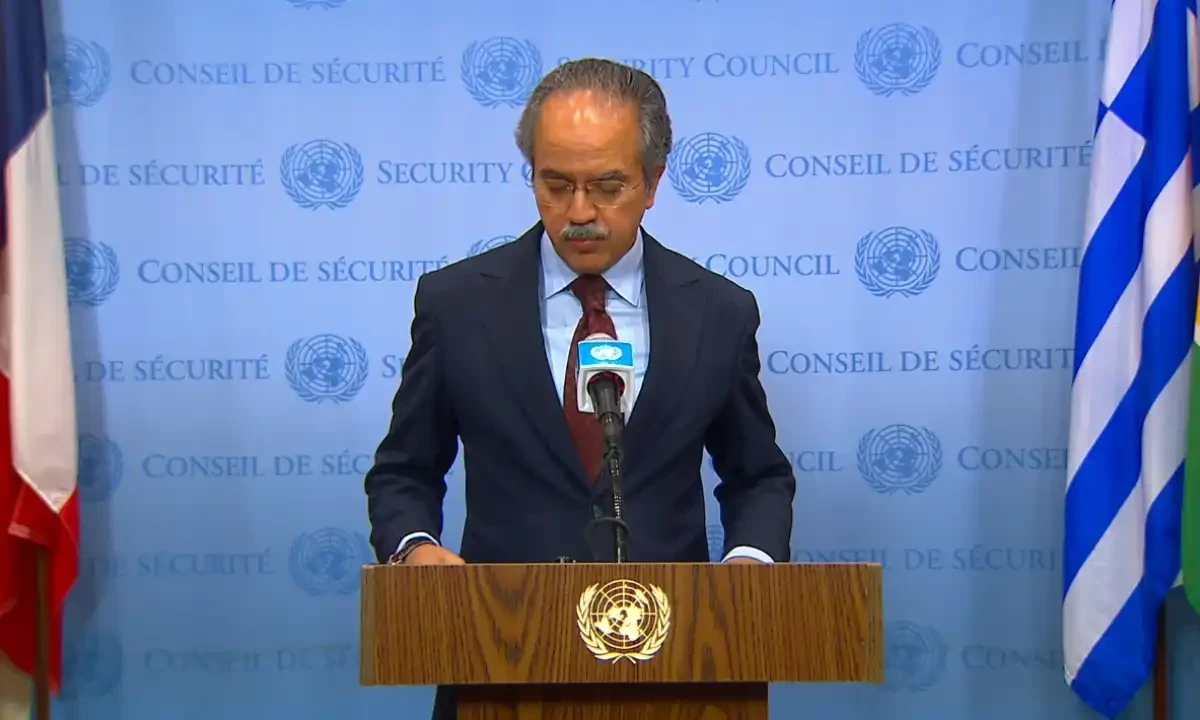Pakistan’s goals ‘largely fulfilled’ at UNSC meeting on South Asia tensions, says Asim Iftikhar
Pakistan’s permanent representative to the UN, Asim Iftikhar, stated that the country’s key goals were “largely served and achieved” during the recent United Nations Security Council (UNSC) meeting.
In a press briefing, emphasized that peace “doesn’t come out of nowhere” and outlined several important issues raised during the meeting.
The United Nations Security Council (UNSC) held a closed-door emergency meeting after Pakistan raised concerns about India’s recent actions in Jammu and Kashmir.
“Several [council] members recognised the imperative of peacefully resolving all issues, including the Jammu and Kashmir dispute, by UNSC resolutions and the wishes of the Kashmiri people,” Iftikhar said.
“There was also a clear sense that regional stability cannot be sustained through unilateralism, it requires principled diplomacy, engagement and adherence to international law.”
He expressed serious concern over India’s recent unilateral actions, particularly the alleged illegal measures taken on April 23, the growing military buildup, and provocative statements. He said these actions, along with credible signs of possible escalation, had dangerously increased tensions in the region.
He clarified that Pakistan did not seek confrontation but was fully prepared to defend its sovereignty and territorial integrity in line with Article 51 of the UN Charter. He added that when peace is at risk in a region that is home to one-fourth of the world’s population, it becomes a matter of global concern.
“What India is claiming is nothing but recycled allegations, unsubstantiated, unverified [and] designed to serve its political interest and strategic objectives, which include trying to divert attention from repression and human rights violations in Jammu and Kashmir and to undermine the legitimate Kashmiri struggle for self-determination,” he said.
“Water is life, not a weapon,” he said. “These rivers sustain over 240 million Pakistanis. Any attempt to disrupt their flow constitutes aggression, and allowing such a precedent would endanger every lower riparian state.”
Iftikhar emphasized that Pakistan had firmly rejected India’s accusations of involvement in the Pahalgam attack, which he said Pakistan and all UN Security Council members had condemned.
He also discussed India’s unilateral suspension of the Indus Waters Treaty, pointing out that the agreement was brokered by the World Bank and had remained in place even during wartime.
“The burden of peace must be shared — the people of Kashmir have waited far too long for justice, and the people of Pakistan will not stand by while their rights to water, to peace, to sovereignty are threatened,” he added.
Read more
PM rejects Indian allegations in call with UN chief, demands for impartial probe
GCC urges India, Pakistan to hold talks, warns against rising Islamophobia
OIC-IPHRC voices concerns over rising Islamophobia, violence against Muslims in India
For the latest news, follow us on Twitter @Aaj_Urdu. We are also on Facebook, Instagram and YouTube.























Comments are closed on this story.